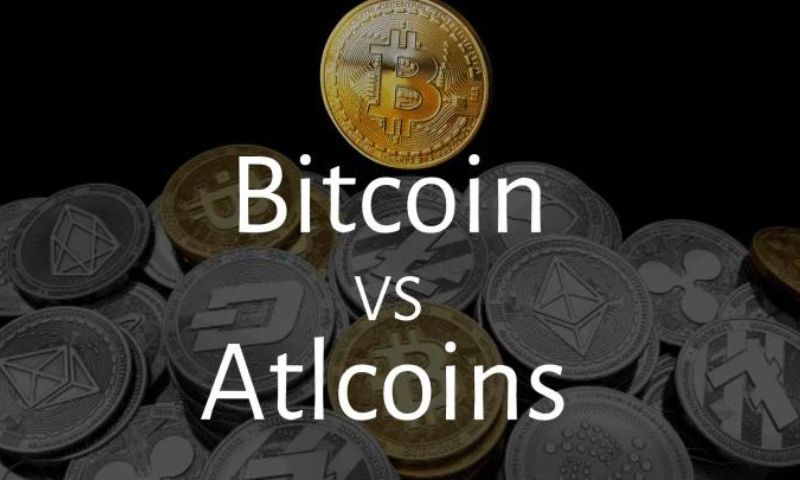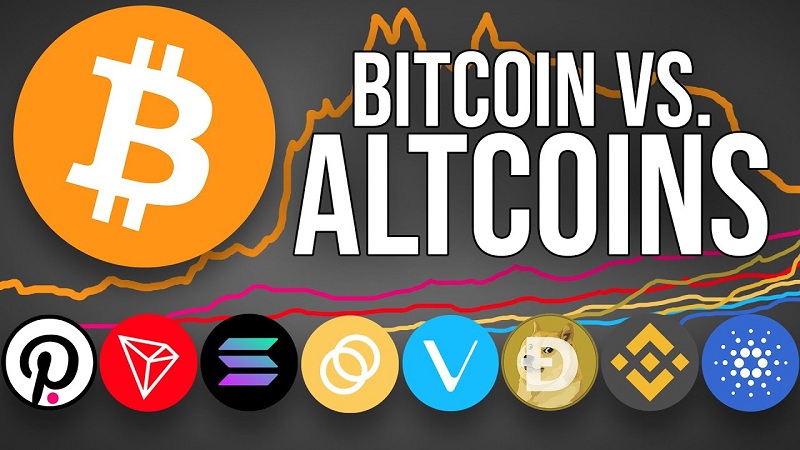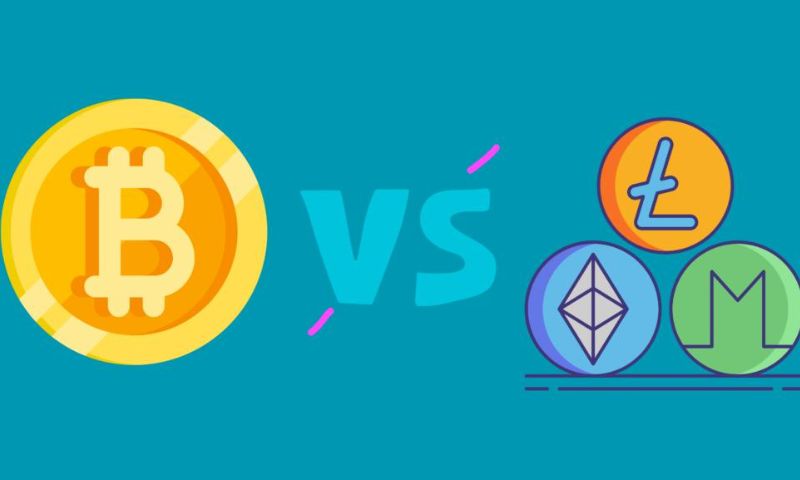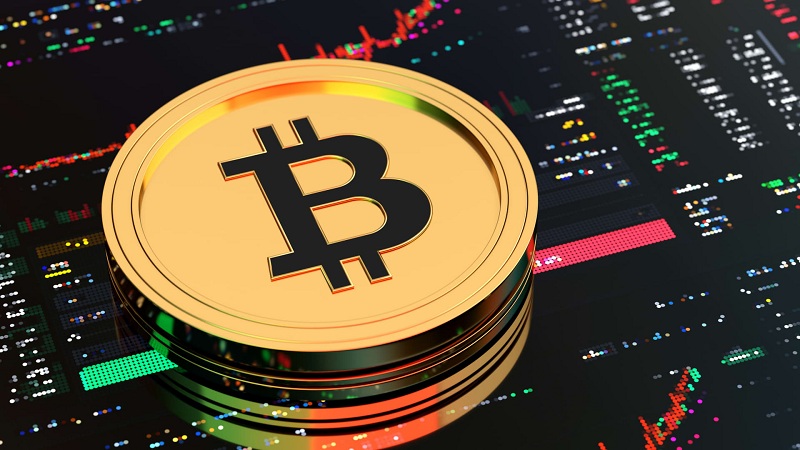Altcoins vs Bitcoin: Unveiling the Crypto Showdown’s Winners and Losers
You’ve heard the buzz about Bitcoin, but what’s the deal with altcoins? Each crypto coin offers a unique flavor in the vast digital currency feast. With the pros and cons of altcoins vs bitcoin shaping the market, understanding the differences is key. Here, you’ll learn what makes Bitcoin the king and why altcoins might steal its crown. Dive into the showdown to spot your winners and steer clear of the losers. Get ready to arm yourself with knowledge that could turbocharge your crypto game.
Understanding the Competitive Landscape: Bitcoin vs. Altcoins
Examining the Bitcoin Dominance Index
The Bitcoin Dominance Index shows how big Bitcoin is in the market. It tells us Bitcoin’s share of the total crypto market value. When this number is high, Bitcoin is the big boss. When it’s low, altcoins are getting stronger. We keep an eye on this to see trends. Bitcoin often leads the way but altcoins can shine too.
Analyzing Altcoins Market Potential
Altcoins offer a world of new tricks. Ethereum came up with smart contracts. They let users deal with each other without a middle man. Like a vending machine on the internet, these contracts could change how we do business. Ripple’s transaction protocol allows fast and cheap money transfers. It can send money worldwide in just seconds. It’s faster than Bitcoin’s ten-minute wait.
Litecoin is like Bitcoin’s little brother. It’s quicker and has lower fees. This makes it great for small everyday buys. Altcoins can give us more privacy too. Privacy coins keep your business secret. They hide who’s sending or getting coins. Others like stablecoins keep their value well. They’re tied to real-world stuff like dollars, less bumpy than Bitcoin.
Altcoins bring more tools to play in the market. They let investors spread out their bets. This is called diversification. It’s important so all your eggs aren’t in one basket. This helps against big price drops. But, altcoins also have risks. They’re new and can change quick. Some sadly die out.
They also can do things Bitcoin can’t. Like harvest energy better. Proof of work, what Bitcoin uses, eats up lots of power. Proof of stake, used by some altcoins, is much kinder to our planet.
Altcoin trading tips? Get to know their roadmaps and what they plan to do. Check out their tokenomics. This is how tokens are made and managed. It’s important to see if they’ll last. Look for coins with good teams that keep their promises and have clear goals.
And let’s talk about holding. Long term or short term? That’s a key question. Long term can pay off if the coin does well. It also means being okay with ups and downs. Some say it’s like riding a roller coaster.
Community support matters too. Coins with strong backers can do better. These folks may help coins grow by spreading the word or using it in real life. And never forget, Bitcoin may get hit by new rules. Governments are still figuring out how to handle crypto. Changes can make prices swing.
Using the Bitcoin Dominance Index, you can gauge the battle. It might signal an altcoin season. This is when altcoins may outperform Bitcoin. When diversifying your portfolio, consider how the market values different coins. This could tip you off on when one type may rise.
Understanding these areas is key. It helps figure out what’s hot or not in the crypto showdown. Whether you root for Bitcoin or its many rivals, the crypto world is always full of surprises.
Investment Strategies: Risk & Reward in Crypto
Diversification through Bitcoin and Altcoins
Let’s talk shop about your crypto coins. Think of your favorite ice cream shop. You walk in, and there’s more than just vanilla, right? Bitcoin’s like vanilla – it’s popular, everyone knows it, and it’s everywhere. But remember those other flavors? They’re altcoins – short for “alternative coins.” Now, you wouldn’t eat vanilla every day, would you? You’d mix it up. That’s diversification. It means spreading money across different investments. It’s smart because if vanilla, I mean Bitcoin, goes south, you’re not left with an empty cone.
Now, you might hear people saying Bitcoin is your safest bet. They’ve got good reasons. It’s been around the longest and has a kind of ‘first-mover advantage’. That’s like being first in line at the ice cream van. But don’t forget altcoins. They’re not just second fiddles. They’ve got their perks, like Ethereum’s smart contracts – think contracts that self-execute when conditions are met. Cool, right? Or Litecoin, which is like Bitcoin but on a turbo boost for transaction speed.
So, should you stuff your wallet with Bitcoin or altcoins? Here’s the scoop. Balance. You don’t want all your eggs, or coins, in one basket. Look into altcoin diversification. It means picking different cryptocurrencies for your portfolio. You could do a mix of Bitcoin, with its stable footing, and some chancy but promising altcoins. Why? To even out the risk and keep things interesting.
Recognizing and Reacting to Market Liquidity Changes
Here comes a big word – liquidity. It’s like when you’re selling lemonade on a hot day. If everyone wants your lemonade, that’s high liquidity – easy to sell. In crypto, it’s about buying or selling your coins without changing their price much. Bitcoin’s got high liquidity; there’s always someone wanting to buy or sell.
But wait, there’s a twist. Even Bitcoin can see liquidity changes. Imagine a sudden hot spell – everyone wants more lemonade now! Same thing can happen with Bitcoin. All of a sudden, lots of buyers or sellers can come in. Your job? Watch for these changes. The market’s like the ocean – sometimes calm, sometimes wavy. You want to surf those waves, not wipe out.
Keep an eye on the Bitcoin dominance index. It shows how much of the total crypto market is Bitcoin. If it’s up, altcoins might be down, and vice versa. That’s your cue. Maybe it’s time to buy more altcoins or sell some off.
Remember, investment’s not a game of chance. It’s about smart choices. Understand the ins and outs of blockchain technology differences. Stay updated on Ethereum benefits and how Ripple’s transaction protocol might change the game. Learn about your altcoins. What’s behind them? What’s their deal? Look at their project roadmaps – yes, cryptos have those too. And always watch for those market liquidity shifts. It’s like your personal crypto weather report.
Playing it smart with Bitcoin versus altcoins can help you win in this crypto showdown. Think long-term, keep your cool, and you just might scoop up the rewards.
Technological Innovations and Their Impact on Investment
The Promise of Altcoin Innovations
Altcoins are the new kids on the block next to Bitcoin. Many of them bring cool tech to the table. Take Ethereum for example. It runs smart contracts that let apps work smoothly. This is a big perk for users who want more from their crypto than just a cash swap. Then there’s Ripple. It’s famous for moving money across borders fast and cheap. People love it for this.
But there’s more to the story. Remember Litecoin? It’s like Bitcoin but zippier. It finishes deals faster and costs less to move. Also, altcoins can help spread out your risk. Think of them as eggs in different baskets. If one goes bad, you’ve got others to fall back on. Plus, they’re growing with new uses and followers every day.
When you pick altcoins, it’s all about tech and timing. You want to jump on the ones with solid plans and real-world use. Check out the project roadmaps and who’s behind the scenes. And watch the communities. Their support can shoot an altcoin’s value to the moon.
Bitcoin’s Scalability Issues and First-Mover Advantage
Now, Bitcoin’s no slouch, it came first and started this whole crypto rush. This gives it a big lead and trust with people. But it has some hiccups too. Bitcoin deals can get jammed when there’s a lot of traffic. And this can make costs go up.
Bitcoin needs to fix its size issues to handle more action. Sure, updates are in the works to speed things up, but it’s a slow go. These issues make altcoins with fast tech look even better to investors.
Yet, Bitcoin’s known the world over and that’s tough to beat. It’s got years of strong performance that makes folks trust putting their money in it. The big question is, will this last? Will altcoins with their shiny new tech overtake Bitcoin?
There are two sides to this coin. With Bitcoin, you get stability and name-power. With altcoins, you get innovation and growth room. Smart investors often mix it up. They hold both types to try and get the best of both worlds.
Keep an eye on how fast each coin moves and how much buzz it’s getting. This can guide you on when to buy or sell. For Bitcoin, thinking long-term has paid off for many. But altcoins can surge quick and net fast wins if you’re sharp.
Remember, all cryptos have risks. Rates can shoot up or tank on a tweet. So, stay on your toes, keep learning, and never bet more than you can afford to lose. It’s all about being smart with the cards you’re dealt in this crypto showdown.
Security and Regulations: Safeguarding Your Crypto Portfolio
Navigating the Bitcoin Regulatory Landscape
Bitcoin’s a big deal, it’s true. But here’s what you need to know: rules are key. Governments around the world are eyeing Bitcoin closely, setting up rules that can shape how you use it. In the US, Bitcoin’s seen kind of like property, so watch out for taxes on any gains you make. Think of it like this: if Bitcoin’s price shoots up and you sell, the taxman will want a piece. It’s just like selling a bike you fixed up at a profit. Staying up to date with these rules is a must to avoid surprises. And hey, more rules could pop up, so keep an ear to the ground.
Best Practices for Crypto Wallets and Exchanges
Now, let’s talk protecting your coins. To keep your Bitcoin and altcoins safe, it’s all about the wallet. A hard wallet, like a safe for your coins, is the way to go. Think USB stick, but for crypto. It’s physical, offline, and a hacker’s nightmare. And for altcoins with smart contracts, like Ethereum, special wallets are there to help.
Exchanges—where you buy and sell crypto—are like banks, but for Bitcoin and the gang. Ones with good reps are your friends, but still, always be careful. Some tips? Don’t keep more on an exchange than you need for trading. And use strong passwords. Like, really strong. No “password123” business.
Remember this: Bitcoin’s first to the party, sure. But with altcoins popping up, offering new tech and faster transactions, it’s a whole new game. Litecoin zips transactions fast, Ripple’s like a rapid money mover for banks, and then there’s the growing list of privacy coins that keep your business your own.
So, friends, the crypto world is a wild ride. But keep your head on straight with strong security and a clear sense of the rules, and you’ll steer clear of trouble while maybe making some coin along the way. Just remember to learn about what makes each coin tick — from Bitcoin’s proof of work to the altcoins with the eco-friendlier proof of stake — so you make the smartest bets with your hard-earned cash. And don’t forget, whether it’s Bitcoin or the newest altcoin, a well-picked mix could lead you to portfolio gold.
We’ve dug deep into the world of crypto, ranging from Bitcoin’s reign to the rise of altcoins. We looked at the Bitcoin Dominance Index and how altcoins offer diverse market prospects. Investing in crypto means weighing risks and rewards, and we need smart moves like spreading our bets and staying alert to market shifts. Technology shifts impact our choices too. Altcoins bring fresh tech to the table, while Bitcoin must tackle growth pains. Yet, its firm spot as a trailblazer holds strong.
For keeping our crypto safe, knowing rules for Bitcoin and using secure wallets and exchanges are key. Bottom line: crypto is a wild ride. Knowing the game, from tech twists to regulation, can help you make choices that are right for you. Let’s ride the wave smartly.
Q&A :
What are the main advantages of altcoins compared to Bitcoin?
Altcoins, or alternative cryptocurrencies to Bitcoin, offer several benefits over their predecessor. Firstly, many altcoins boast improved transaction speeds, providing quicker transfer times. Secondly, several altcoins use more energy-efficient consensus mechanisms than Bitcoin’s proof-of-work (PoW) system, which can lead to lower transaction fees and reduced environmental impact. Additionally, altcoins often introduce innovative features and enhancements that address some of the limitations of Bitcoin, such as increased privacy, smart contract capabilities, and different use cases.
How do altcoins differ from Bitcoin in terms of investment potential?
Investing in altcoins can present different opportunities and risks compared to Bitcoin. Altcoins often have a smaller market capitalization, which can lead to higher volatility but also the potential for more significant gains if the coins increase in value. However, they also tend to be less well-known and less liquid, making them more susceptible to market manipulation. It’s important for investors to conduct thorough research and understand the unique value proposition of each altcoin before investing.
What are the downsides of using altcoins over Bitcoin?
While altcoins can offer various improvements and opportunities, there are some drawbacks to consider. One major downside is the relative lack of adoption and acceptance of altcoins compared to Bitcoin. This results in fewer places to spend altcoins and sometimes less infrastructure support. Additionally, the altcoin market is more fragmented and can be confusing for new users, with thousands of different coins available. Finally, altcoins, being generally newer and less established, can carry a higher risk of loss, scams, or abandonment by developers.
Does Bitcoin have any technological advantages over altcoins?
Despite the emergence of altcoins with various improvements and new features, Bitcoin still maintains several technological advantages. It benefits from the most secure blockchain, underpinned by widespread mining and substantial computational power. This makes Bitcoin’s network incredibly robust against attacks. Moreover, Bitcoin’s longevity and its established position as the original cryptocurrency lend it a higher degree of recognition and trust among the public and institutional investors, which has often been equated to a ‘digital gold’ standard.
How important is diversity in a cryptocurrency portfolio with altcoins and Bitcoin?
Diversification is a key principle in investment, and this applies to cryptocurrency portfolios as well. Including both Bitcoin and a selection of promising altcoins can help to spread risk, as the assets may not all move in tandem with each other. Altcoins can sometimes offer high growth potential due to their innovations and niche applications. Nevertheless, the high volatility and risks associated with individual altcoins mean that investors should carefully consider their investment size and choose a balanced mix that reflects their risk tolerance and investment goals.






